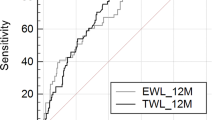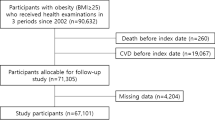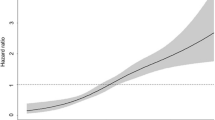Abstract
OBJECTIVE: To investigate the extent of carotid artery atherosclerosis in obese subjects and to examine the possible effects of weight loss on atherosclerotic development.
DESIGN: Controlled 4 y intervention study.
SUBJECTS: 20 obese patients treated with weight-reducing gastroplasty, 19 obese patients treated with dietary recommendations and 35 lean subjects.
MEASUREMENTS: Body weight, blood pressure, blood lipids, glucose and insulin were measured. A B-mode ultrasound was recorded to determine the intima-media thickness (IMT) and lumen diameter (LD) of the carotid artery. Study groups were investigated at baseline and re-examined after 3 to 4 y of follow-up.
RESULTS: At baseline, obese patients had higher blood pressure, serum total cholesterol, triglycerides, glucose and insulin compared with lean subjects; they also had a larger IMT in the carotid artery bulb (P<0.05) and a larger LD in the common carotid artery (P<0.01). After 4 y of follow-up, obese patients treated with surgery displayed a mean weight loss of 22 kg (19%), while the average weight in the obese control group remained unchanged (P<0.001). The weight loss group showed improvements in blood pressure, HDL-cholesterol, triglycerides and insulin compared with the obese control group (P<0.05). The progression rate of carotid bulb IMT in the weight loss group was similar to that observed in the lean control group (0.024 vs 0.025 mm/y, n.s.), whereas the IMT progression rate was almost three times higher in the obese control group (0.068 mm/y, P<0.05 compared with lean controls).
CONCLUSION: Obese people have an unfavourable risk factor profile and signs of premature carotid artery atherosclerosis. Weight loss is followed by an improvement in several risk factors and may reduce the progression rate of atherosclerotic changes in the carotid artery bulb.
This is a preview of subscription content, access via your institution
Access options
Subscribe to this journal
Receive 12 print issues and online access
$259.00 per year
only $21.58 per issue
Buy this article
- Purchase on Springer Link
- Instant access to full article PDF
Prices may be subject to local taxes which are calculated during checkout
Similar content being viewed by others
Author information
Authors and Affiliations
Corresponding author
Rights and permissions
About this article
Cite this article
Karason, K., Wikstrand, J., Sjöström, L. et al. Weight loss and progression of early atherosclerosis in the carotid artery: a four-year controlled study of obese subjects. Int J Obes 23, 948–956 (1999). https://doi.org/10.1038/sj.ijo.0801024
Received:
Revised:
Accepted:
Published:
Issue Date:
DOI: https://doi.org/10.1038/sj.ijo.0801024
Keywords
This article is cited by
-
Influence of BMI on virtual coronary artery calcium scoring
The International Journal of Cardiovascular Imaging (2022)
-
Changes of Carotid Intima-Media Thickness After Sleeve Gastrectomy in High Cardiovascular Risk Patients: a Prospective Study
Obesity Surgery (2021)
-
Empagliflozin attenuates neointimal hyperplasia after drug-eluting-stent implantation in patients with type 2 diabetes
Heart and Vessels (2020)
-
Sleeve Gastrectomy and Gastric Bypass Decrease the Carotid Intima-Media Thickness in Obese Men: Association with Weight Loss, Cardiovascular Risk Factors, and Circulating Testosterone
Obesity Surgery (2020)
-
Early Regression of Carotid Intima-Media Thickness after Bariatric Surgery and Its Relation to Serum Leptin Reduction
Obesity Surgery (2018)



